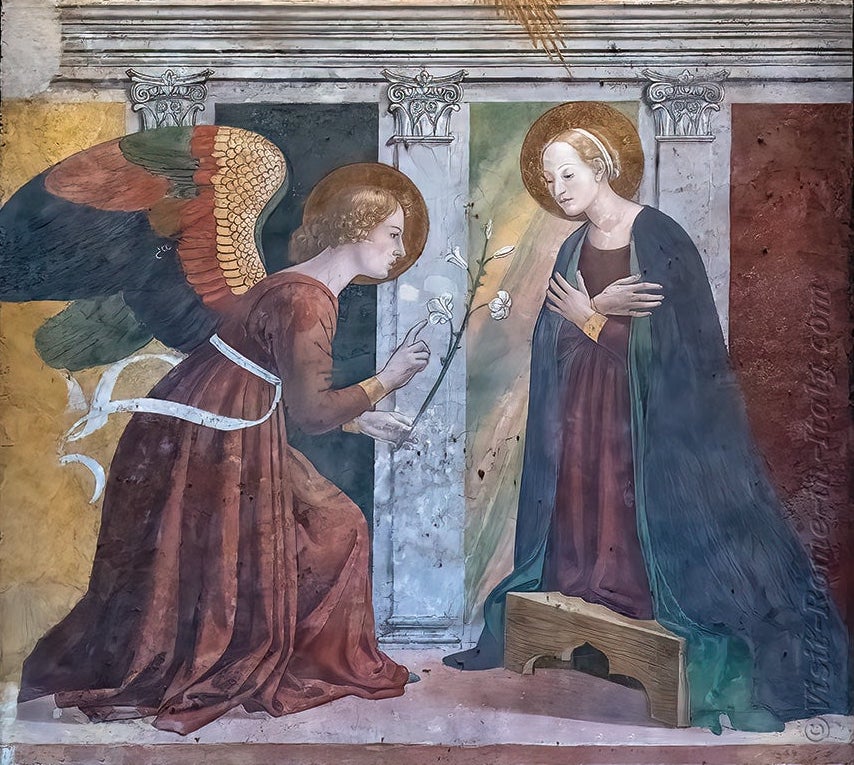
Sermons
Annunciations
December 17, 2023

Since the early centuries of the Church, countless artists have depicted this encounter between Gabriel and Mary. One of the earliest images of the annunciation comes from the second century, in the Priscilla Catacomb on the Via Salaria in Rome. The annunciation was a favored subject in the Middle Ages and Renaissance.
My favorite is the one by Melozzo da Forli (c.1438-1494). You can find it in the Pantheon in Rome, to the right, as you enter from the portico. There’s something striking about these depictions. Gabriel arrives on the left in all his glory; Mary is seated or standing on the right, with her head slightly bowed. And notice that she’s leaning forward toward Gabriel, leaning in toward the announcement. Don’t we do the same thing when we’re in a serious conversation, actively listening, giving our full attention? We lean our bodies forward into what is being said to us. It’s this “‘bending toward’ of spirit, intellect, and ear”—all that she is, that allowed Mary to become Mary. [1]
It’s this posture of actively listening, actively passive, and receptive to the divine summons that captures the full reach and depth of the religious life so beautifully. We know that Mary was special—and she was. What was asked of her was undoubtedly unique. Her life and the life she carried into the world were particular events in the history of the world. Absolutely. Therefore, “Hail, Mary. Blessed art thou among women.” As our Roman Catholic siblings say, “Hail, Mary, full of grace.”
But we must also be careful that our adoration and respect exempt us from a comparable summons to serve God with our lives. Not in exactly the same way, but something comparable. There was only one Mary, and there was only one Jesus. However, implicit in this extraordinary birth story is the notion that something comparable
could—probably is—being asked of us. If we remain open, similar annunciations are still being made to us.
The medieval German philosopher, theologian, mystic Meister Eckhart (c.1260–c.1328) made this provocative claim, “We are all meant to be mothers of God, for God is always needing to be born.”[2] I believe this is true whether male or male. We’re all meant to be mothers of God, giving birth through our lives to the very life of God. And in this sense, you and I are being equally summoned and called. God is always asking something of us. Mary shows us how to answer that call, how to surrender to it and accept the life God is giving us. Before she could sing out in joy, she had to consent. She had to yield. Mary shows how to truly prepare for the way of God coming into the world. What was true then is still true now. Will we attend to the voice of God? What is being announced to you? What is trying to be born through you? Will we tend to and how will we nurture what God is birthing in us through Christ?
God is always advent-ing—coming toward us, speaking, like Gabriel, summoning us to fulfill the purpose of our lives—and, like Mary, let us lean forward, lean into what is being said, attentive, listening to the divine voice, God’s summons calling us to life—calling us to bear witness to God’s light breaking into the world.
Sources
[1] Fra Angelico’s (1395-1455), The Virgin of the Annunciation, is another good example of this portrayal. I’m grateful for George Steiner’s comment on Fra Angelico’s Virgin of the Annunciation, which became the basis for this reflection. It’s found in Steiner’s study of the thought of Martin Heidegger (1889-1976), Martin Heidegger (Chicago: University of Chicago Press, 1989), 130. See also Iain McGilchrist, The Master and his Emissary: The Divided Brain and the Making of the Western World (New Have: Yale University Press, 2009), 152.
[2] The full quote reads: “We are all meant to be mothers of God. What good is it to me if this eternal birthof the divine Son takes place unceasingly, but does not take place within myself? And, what good is it to me if Mary is full of grace if I am not also full of grace? What good is it to me for the Creator to give birth to his Son if I do not also give birth to him in my time and my culture? This, then, is the fullness of time: When the Son of Man is begotten in us.” Meister Eckhart, The Essential Sermons, Commentaries, Treatises and Defense (Paulist Press, 1981). See also Matthew Fox, The Coming of the Cosmic Christ: The Healing of Mother Earth and the Birth of a Global Renaissance (San Francisco: HarperOne, 1988), 122.